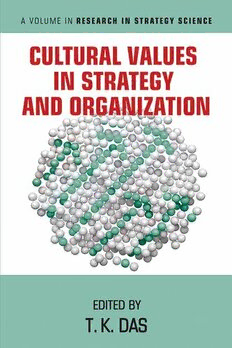Table Of ContentCultural Values
in Strategy and
Organization
A volume in
Research in Strategy Science
T. K. Das, Series Editor
RESEARCH IN STRATEGY SCIENCE
T. K. Das, Series Editor
Published
Time Issues in Strategy and Organization (2019)
Edited by T. K. Das
Cultural Values in Strategy and Organization (2021)
Edited by T. K. Das
In Development
Managerial Practice Issues in Strategy and Organization
Cultural Values
in Strategy
and Organization
edited by
T. K. Das
City University of New York
INFORMATION AGE PUBLISHING, INC.
Charlotte, NC • www.infoagepub.com
Library of Congress Cataloging-in-Publication Data
A CIP record for this book is available from the Library of Congress
http://www.loc.gov
ISBN: 978-1-64802-512-9 (Paperback)
978-1-64802-513-6 (Hardcover)
978-1-64802-514-3 (E-Book)
Copyright © 2021 Information Age Publishing Inc.
All rights reserved. No part of this publication may be reproduced, stored in a
retrieval system, or transmitted, in any form or by any means, electronic, mechanical,
photocopying, microfilming, recording or otherwise, without written permission
from the publisher.
Printed in the United States of America
CONTENTS
About the Book Series .........................................................................vii
T. K. Das
1 Ecological Organizing: Implications of Evolving Cultural
Values for Organization and Strategy ..................................................1
Peter J. Robertson and Joseph W. Harder
2 Have You Seen Corporate Cultural Responsibility?
Prospects of a New Construct for Corporations Operating
Across Communities ...........................................................................65
W. G. (Will) Zhao, Kyle Neabel, and Jingjing Du
3 Managing Cultural Integration in Mergers and Acquisitions .........83
José-Luis Rodríguez-Sánchez, Eva-María Mora-Valentín,
and Marta Ortiz-de-Urbina-Criado
4 Culture, Paradoxical Frames, and Behavioral Strategy ..................109
Joshua Keller and Erica Wen Chen
5 Cultural Values in the Fair-Trade Market: Examining
Producers’ Organizations .................................................................133
Mantiaba Coulibaly-Ballet, Zorana Jerinic, and Djamila Elidrissi
6 National Culture and Legitimacy in International Alliances ........151
Rajesh Kumar and T. K. Das
v
vi Contents
7 Are Family Businesses Values-Driven Organizations?
An Exploratory Research ..................................................................171
Angela Dettori and Michela Floris
8 The Case of Executives’ Cultural Intelligence in Behavioral
Strategy: An Introductory Essay and a Research Agenda ..............187
Arash Najmaei
9 Building an Alliance Culture: Lessons From Quintiles .................229
Dave Luvison, Ard-Pieter De Man, and Jack Pearson
10 Personal Values of Civil Engineers and Architects in the
Strategic Decisions of Construction Companies ............................259
Atilla Damci, David Arditi, Gul Polat, and Harun Turkoglu
11 Cultural Characteristics of Chilean and Brazilian Workforces
and Strategic Human Resource Management: An Integrative
Literature Review ..............................................................................279
Francisca Álvarez-Figueroa
About the Contributors .....................................................................327
Index ..................................................................................................335
ABOUT THE BOOK SERIES
The field of strategy science has grown in both the diversity of issues it ad-
dresses and the increasingly interdisciplinary approaches it adopts in un-
derstanding the nature and significance of problems that are continuously
emerging in the world of human endeavor. These newer kinds of challenges
and opportunities arise in all forms of organizations, encompassing private
and public enterprises, and with strategies that experiment with breaking
the traditional molds and contours. The field of strategy science is also, per-
haps inevitably, being impacted by the proliferation of hybrid organizations
such as strategic alliances, the upsurge of approaches that go beyond the
customary emphasis on competitiveness and profit making, and the inter-
mixing of time-honored categories of activities such as business, industry,
commerce, trade, government, the professions, and so on. The blurring of
the boundaries between various areas and types of human activities points
to a need for academic research to address the consequential developments
in strategic issues. Hence, research and thinking about the nature of issues
to be tackled by strategy science should also cultivate requisite variety in
issues recognized for research inquiry, including the conceptual founda-
tions of strategy and strategy making, and the examination of the critical
roles of strategy makers, strategic thinking, time and temporalities, business
and other goal choices, diversity in organizing modes for strategy imple-
mentation, and the complexities of managing strategy, to name a few. This
book series on Research in Strategy Science aims to provide an outlet for ideas
and issues that publications in the field do not provide, either expressly or
adequately, especially as regards the comprehensive coverage deserved by
Cultural Values in Strategy and Organization, pages vii–viii
Copyright © 2021 by Information Age Publishing
All rights of reproduction in any form reserved. vii
viii About the Book Series
certain emerging areas of interest. The topics of the volumes in the series
will keep in view this objective to expand the research areas and theoreti-
cal approaches routinely found in strategy science, the better to permit
expanded and expansive treatments of promising issues that may not suf-
ficiently align with the usual research coverage of publications in the field.
—T. K. Das
City University of New York
Series Editor
Research in Strategy Science
CHAPTER 1
ECOLOGICAL ORGANIZING
Implications of Evolving Cultural Values
for Organization and Strategy
Peter J. Robertson
Joseph W. Harder
ABSTRACT
The primary claim of this chapter is that organizations are evolving from a
bureaucratic form grounded in the mechanistic thinking of the Industrial
Era into a new organizational form we call “ecological organizing” that is
informed by a new ecological paradigm emerging as society transitions into
the Information Age. After introducing the framework of cultural values un-
derlying our analysis, we begin by identifying four core values incorporated
into the bureaucratic model and summarizing key criticisms of this organiza-
tional form. Next we explain how organizations began changing in response
to these criticisms, initially through the organization development movement
and then more substantially as growing environmental turbulence demanded
more organic organizations. We then introduce some of the foundational
ideas of the new paradigm and indicate how they are influencing thinking
about and practices in organizations. This leads to the discussion of ecologi-
cal organizing, where we first address the notion of living organizations and
Cultural Values in Strategy and Organization, pages 1–64
Copyright © 2021 by Information Age Publishing
All rights of reproduction in any form reserved. 1

